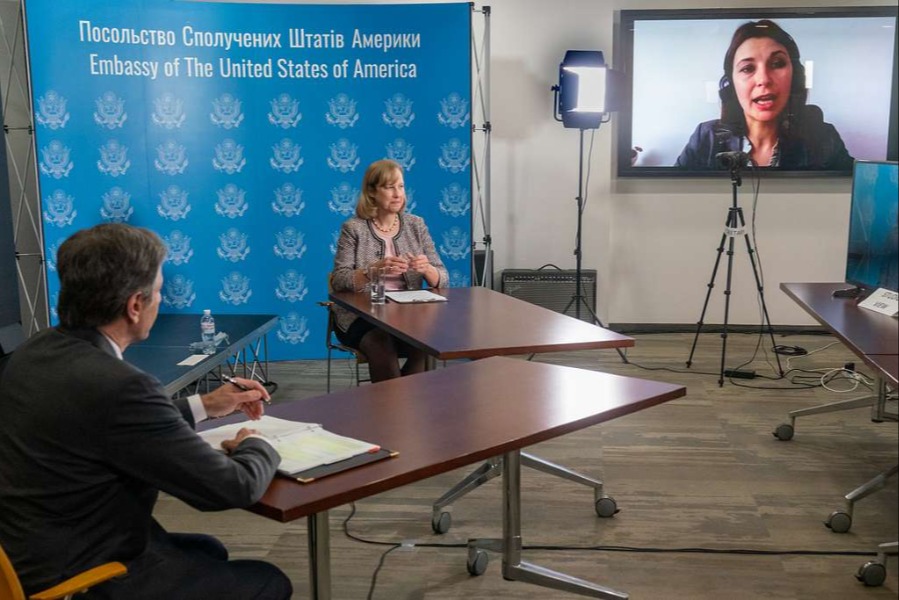Today's Headlines and Commentary
A shooter killed four and injured three at two military facilities in Chattanooga yesterday before dying of a gunshot wound. Authorities identified the gunman as Mohammod Youssef Abdulazeez, a Kuwaiti-born naturalized American citizen. The New York Times writes that the FBI is conducting a “national security investigation” on the attack, while a U.S.
Published by The Lawfare Institute
in Cooperation With

A shooter killed four and injured three at two military facilities in Chattanooga yesterday before dying of a gunshot wound. Authorities identified the gunman as Mohammod Youssef Abdulazeez, a Kuwaiti-born naturalized American citizen. The New York Times writes that the FBI is conducting a “national security investigation” on the attack, while a U.S. attorney for the Eastern District of Tennessee stated that authorities were “treating this like an act of domestic terrorism.” The Times also quotes several unnamed officials as stating that the attack “fits the pattern” of “lone wolf” violence called for by ISIS, but authorities have not yet found links between Abdulazeez and any terrorist organization, though it appears that he traveled to Jordan for seven months last year. The Wall Street Journal has more. The Daily Beast provides details of Abdulazeez’s blog, which contains only two posts, both about Islam.
The U.N. Security Council will vote on the nuclear deal with Iran at 9 am this Monday, Reuters reports. A draft of the resolution appears to have leaked yesterday, though its authenticity has not yet been confirmed.
While the U.N.S.C. vote is scheduled for Monday, the U.S. Congress still has 60 days to consider and vote on the deal---and some members of Congress are less than happy over how quickly the Security Council is moving. Yesterday evening, Senators Bob Corker (R-TN) and Ben Cardin (D-MD) of the Senate Foreign Relations Committee sent a letter to President Obama asking for the U.N. vote to be postponed until after Congress has a chance to weigh in. Politico examines the arguments currently roiling the House and Senate.
Beyond Congress, the Obama administration is now tasked with selling the nuclear deal to its allies in the Middle East. Saudi Arabia Foreign Minister Adel al Jubeir met with Secretary of State John Kerry on Thursday and will meet with President Obama on Friday, the Wall Street Journal tells us, and Secretary Kerry will travel to Doha in early August to meet with members of the Gulf Cooperation Council. Among the Gulf states, Saudi Arabia has been most vocal in its concerns over the deal. Meanwhile, the Times ponders the political future of Israeli Prime Minister Benjamin Netanyahu, who had devoted himself to opposing any potential nuclear deal with Iran,
Nevertheless, Iran’s wary neighbors may have some cause for cautious optimism…or, then again, maybe not. A recent CIA intelligence assessment suggests that, while Iran will likely receive a roughly $100 billion boost from sanctions relief, very little of that money will go to supporting terrorism and militant groups in the region. Rather, Iran will probably funnel the money into relief for its sputtering economy. The Los Angeles Times describes this cheerful assessment as “controversial,” to say the least.
And finally, President Hassan Rouhani also has some sweet-talking to do. The Journal reports on his efforts to maintain domestic political support for the deal---especially the support of Supreme Leader Ayatollah Ali Khamenei, which will be crucial in the coming months. Iranian hard-liners, also seeking the Supreme Leader’s approval, have been quick to criticize what they see as unacceptable concessions. The Times has the story.
In Yemen, government forces have achieved a major victory after gaining control of the port city of Aden, successfully pushing Houthi fighters out of the city. The Guardian notes that Vice President Khaled Bahah made the official announcement of Aden’s recapture on his Facebook page. According to the Journal, the effort to retake Aden involved cooperation between Saudi-backed militias, U.A.E. special forces, and fighters from al Qaeda in the Arabian Peninsula. Perhaps worryingly, AQAP is making important strides with Yemen as a counterbalancing force against the Houthis.
Saudi Arabia hosted a Hamas delegation in Riyadh this Friday, including Hamas leader Khaled Meshaal. The meeting was the first between Hamas and the Saudis in many years and may represent a warming of relations between the two sides under the rule of Saudi Arabia’s recently crowned King Salman. The Telegraph suggests that the meeting may have been spearheaded by Saudi Arabia’s efforts to marshal Sunni cooperation against an Iran no longer weakened by sanctions.
In response to a Freedom of Information request, the U.K. government has released information acknowledging that U.K. forces have been participating in U.S. and Canadian airstrikes over Syria. The United Kingdom has been involved in the airstrikes since earlier this year, though British involvement had not been made public or revealed to Parliament, the Journal writes. The Guardian reports that Prime Minister David Cameron was aware of the airstrikes, and situates U.K. involvement in context of the “special relationship.”
On Wednesday, France arrested four individuals suspected of plotting to attack military bases and a high-ranking military official. Now, the Guardian tells us that the plotters had received instructions from a member of ISIS in Syria to “hit France” with an attack. Following last month’s ISIS-linked attack at a gas plant in Lyons, France has been on increased alert over potential extremist violence.
Afghan President Ashraf Ghani stated today that peace talks with the Taliban are “the solution… to end the bloodshed” that has long troubled Afghanistan, going so far as to thank the Taliban’s Mullah Omar for his endorsement of the negotiations. Al Jazeera has more.
The string of attacks conducted by Boko Haram continued today on the Eid holiday, with at least 64 people killed and 75 wounded in twin suicide bombings in northeast Nigeria. The group has recently increased its violent activities in recent, dating to the beginning of the holy month of Ramadan and the inauguration of President Muhammadu Buhari, who has vowed to crack down on Boko Haram. Defense One also investigates the situation of the girls abducted by Boko Haram from Chibok, many of whom may have been forced to carry out atrocities on behalf of the extremist group.
According to U.N. human rights investigators, a humanitarian crisis may be imminent in Burundi as political clashes continue. In a statement issued by the office of the U.N. High Commissioner for Human Rights, the group warned of the potential for “mass atrocities” and called for action on the part of the Security Council.
Indonesia is becoming increasingly worried over the Islamic State’s influence. The Journal explains Indonesian authorities’ concerns that they may not have enough legal tools to keep ISIS-inspired ideology from spreading through the country, which is home to the world’s largest Muslim population.
Following recent controversial military power reforms in Japan, top military commander Admiral Katsutoshi Kawano announced yesterday that Japan would consider conducting patrols and surveillance activities in the South China Sea. He told the Center for Strategic and International Studies that “our position on this is that we consider this as a potential future issue to be considered depending on how things pan out.” Kawano met with his U.S. counterpart General Martin Dempsey earlier yesterday to discuss the implementation of updated bilateral defense guidelines agreed upon this year. The Guardian has the story.
It has been exactly one year to the day since Malaysia Airlines Flight 17 was shot down in eastern Ukraine. New footage has emerged that shows Russian-backed separatists ransacking the luggage of the 298 passengers and crew that were aboard the flight. The dispute over who is responsible for downing of the jetliner continues, but the Dutch Safety Board tells CNN that their official report, “slated to be released in October, will say that MH17 was destroyed by a Buk missile — a Russian surface-to-air missile — that was used, launched from a village in Russian rebel controlled territory.’”
On Wednesday, a lawsuit was filed in Chicago against the former separatist commander in Ukraine, reports the International Business Times. The suit, filed on behalf of 18 passengers, seeks $900 million in damages for claims that “the rebel army under the command responsibility of defendant Girkin shot down the subject Boeing 777-200 aircraft."
Meanwhile, as the Ukraine-Russia conflict death toll surpases 6,500, Ukraine’s parliament took the first step yesterday toward “granting temporary self-rule to pro-Russian rebels under a change to the constitution the West hopes can end one of Europe's deadliest wars in recent years.” Washington has reassured Ukrainian President Petro Poroshenko that the United States will continue supporting and backing Kiev. The AFP has the story.
On Wednesday, the U.S. Air Force announced a plan to battle the "critical shortage” of drone pilots by luring recruits with a $15,000-a-year bonus. Secretary of the Air Force Deborah Lee James also stated that some pilots graduating from flight school over the next year will automatically be assigned to drone duty. The Journal says that the Air Force, “which flies Predator, Reaper and Global Hawk drones, has struggled to keep up with that demand largely due to the service’s inability to identify, train and retain enough drone pilots.”
U.S. Secretary of Defense Ashton Carter is ruffling feathers with some of the largest defense contractors as he pushes to recruit Silicon Valley start ups to consider offering new military technologies. Defense companies have rebuked the idea, Politico describes, claiming that Silicon Valley tech companies do not have the “slightest idea about military needs or understand how to navigate the Pentagon’s acquisition system.”
In a victory for privacy advocates, a UK High Court ruled that grants of power allowing police and security services to spy on people do not include appropriate safeguards. The law was fast-tracked through Parliament last July after the European Court of Justice struck down existing powers available to intelligence services. Two High Court judges found that the extensive spying powers in the Data Retention and Investigatory Powers Act were "inconsistent with EU law." The government says it "disagreed absolutely" with the court's ruling and plans to appeal. The BBC has the story.
Wired presents two charts showing how the drug war drives U.S. domestic spying. Law enforcement’s surveillance in America, especially its ever-increasing use of wiretaps, has been primarily focused on narcotics cases for the last 25 years.
Speaking of that drug war…. According to the Times, U.S. authorities sought to extradite drug lord Joaquin “El Chapo” Guzman less than three weeks before his already-notorious escape from a Mexican prison. The request was turned down by the Mexican government, in an exchange that points to the fraught relationship between the two countries on the topic of Mexico’s ongoing war with drug cartels.
Parting shot: What are we all afraid of? That’s the question asked by Pew’s recent worldwide poll on top global threats, helpfully sorted by threat, nation, and region of the world in this helpful Guardian interactive.
ICYMI: Yesterday, on Lawfare
Suzanne Maloney considered what the nuclear deal means for both the United States and Iran.
Tamara Cofman Wittes wrote on the possibility of stabilizing the Middle East in the wake of the deal.
Ben alerted us to a video of a homemade armed drone.
Shadi Hamid pondered whether the nuclear deal was “worth it” and expressed his own doubts on the matter.
Matthew Weybrecht pointed out some clever provisions of the deal and the draft Security Council resolution, which will allow conventional arms and ballistic missile sanctions to simultaneously be lifted and kept in place.
Cody posted Senators Corker and Cardin’s open letter to President Obama requesting a delay of the U.N. Security Council’s vote on Iran.
Email the Roundup Team noteworthy law and security-related articles to include, and follow us on Twitter and Facebook for additional commentary on these issues. Sign up to receive Lawfare in your inbox. Visit our Events Calendar to learn about upcoming national security events, and check out relevant job openings on our Job Board.






